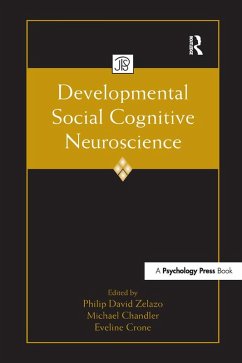The chapters in this book highlight the latest and best research in this emerging field, and they cover a range of topics, including the typical and atypical development of imitation, impulsivity, novelty seeking, risk taking, self and social awareness, emotion regulation, moral reasoning, and executive function. Also addressed are the potential limitations of a neuroscientific approach to the development of social cognition.
Intended for researchers and advanced students in neuroscience and developmental, cognitive, and social psychology, this book is appropriate for graduate seminars and upper-level undergraduate courses on social cognitive neuroscience, developmental neuroscience, social development, and cognitive development.
Dieser Download kann aus rechtlichen Gründen nur mit Rechnungsadresse in A, B, BG, CY, CZ, D, DK, EW, E, FIN, F, GR, HR, H, IRL, I, LT, L, LR, M, NL, PL, P, R, S, SLO, SK ausgeliefert werden.
Hinweis: Dieser Artikel kann nur an eine deutsche Lieferadresse ausgeliefert werden.









